
ICAS Bulletin (online ISSN 2836-3418, print ISSN 2836-340X) is published every other week throughout the year at 1919 M St NW, Suite 310, Washington, DC 20036.
The online version of ICAS Bulletin can be found at chinaus-icas.org/bulletins/.
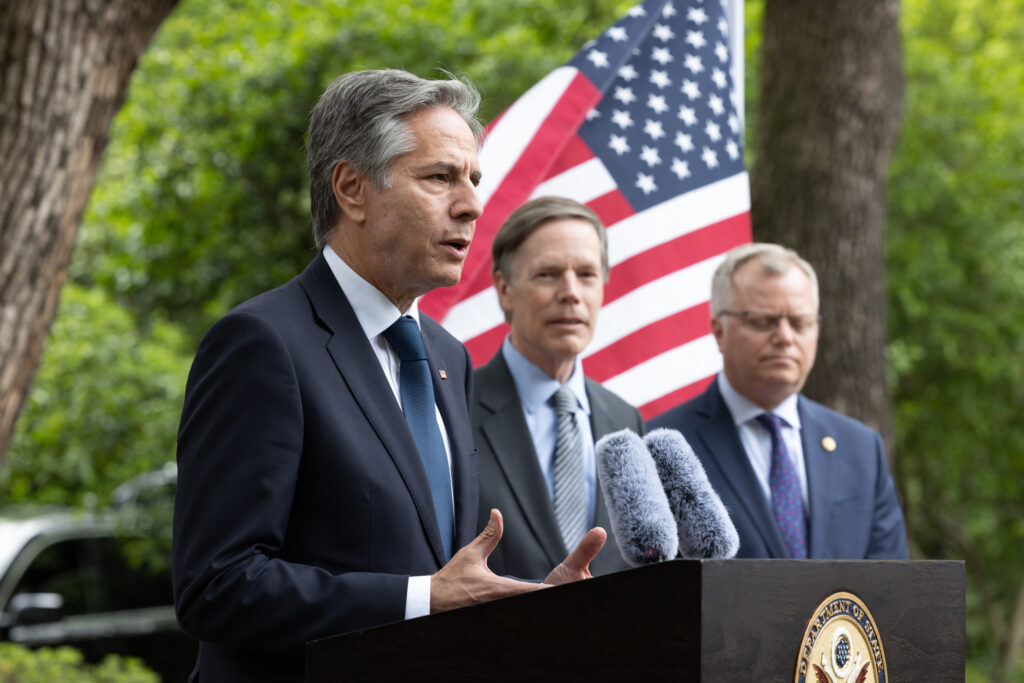
– At the end of April, U.S. Secretary of State Antony Blinken visited Shanghai and Beijing for three days, meeting with several Chinese officials as well as American citizens in his second visit to the country in less than a year.
– On April 26, Blinken met with Chinese President Xi Jinping in Beijing to discuss a lengthy list of timely and contentious topics—including Russia’s military support from China—emphasizing to President Xi that the U.S. is “committed to maintaining and strengthening lines of communication” to prevent “any miscommunications, any misperceptions and any miscalculations.”
– President Xi, among other remarks, told Blinken that the U.S. inability to accept China’s development “in a positive light” is a “fundamental issue” that needs to be addressed. President Xi also noted the positive progress made since last November and how the U.S. and China “should be partners, not rivals.”
– Blinken also met with Chinese Foreign Minister Wang Yi for five and a half hours, during which Wang Yi noted U.S.-China relations is “beginning to stabilize” but negativity and “disruptions” are still growing and interfering. Both sides expressed a desire to be clear and direct about their countries’ stances on relevant issues.
– Secretary Blinken also met with members of the U.S. business and university communities in Shanghai, spent time at a basketball game, and explored the city with U.S. Ambassador to China Nicholas Burns.
Associated News References:
“In Beijing, Blinken and Xi stress need for continued U.S.-China dialogue to avoid ‘any miscommunications,’” CBS News, April 26
“China’s Xi says the U.S. needs to accept Beijing’s rise for bilateral relations to improve,” CNBC, April 26
“China warns US not to step on its ‘red lines,’” BBC, April 26
“Xi tells Blinken that China and the US should be ‘partners, not rivals,’” France 24, April 26
“Blinken meets with Xi, as U.S. objects to China’s support of Russia,” Axios, April 26
“Xi Warns Blinken Against ‘Vicious Competition’ Between US, China,” Bloomberg, April 25 [Paywall]

– Despite legislative movement in the U.S. and its own protective measures against Chinese technology, officials in Europe are not looking to apply a blanket TikTok ban, which one called “quite American,” as they have their Digital Services Act and other methods to address their situation.
– As the pile of lawsuits accusing social media platforms–such as TikTok—of addicting American youth continues to grow, along with accusations of differing levels of protections based on country, TikTok’s Beijing-based owner ByteDance is reportedly not sharing information with U.S. lawyers on the basis that such information is irrelevant to their cases.
– 58% of the responders to a two-day Reuters/Ipsos poll agreed with a statement that the Chinese government uses TikTok to “influence American public opinion” while 13% disagreed and the remainder were either unsure or did not respond.
– On April 24, U.S. President Joe Biden signed a foreign aid package into law that included a long-debated bill giving TikTok’s owner ByteDance one year to sell TikTok or have the app be banned from operating within the U.S. on the grounds of protecting U.S. user data and national security.
– ByteDance denied foreign media reports that the company was looking to sell TikTok, clarifying that there are no such plans.
Associated News References:
“Europe is nowhere close to banning TikTok,” Politico, May 3
“TikTok Fights to Keep China Platform Out of US Addiction Suits,” Bloomberg, May 2 [Paywall]
“Most Americans see TikTok as a Chinese influence tool, Reuters/Ipsos poll finds,” Reuters, May 1
“Here’s more details about the access ByteDance had to U.S. TikTok user data,” Fortune, April 30 [Paywall]
“ByteDance says it won’t sell TikTok business in US,” The Hill, April 26
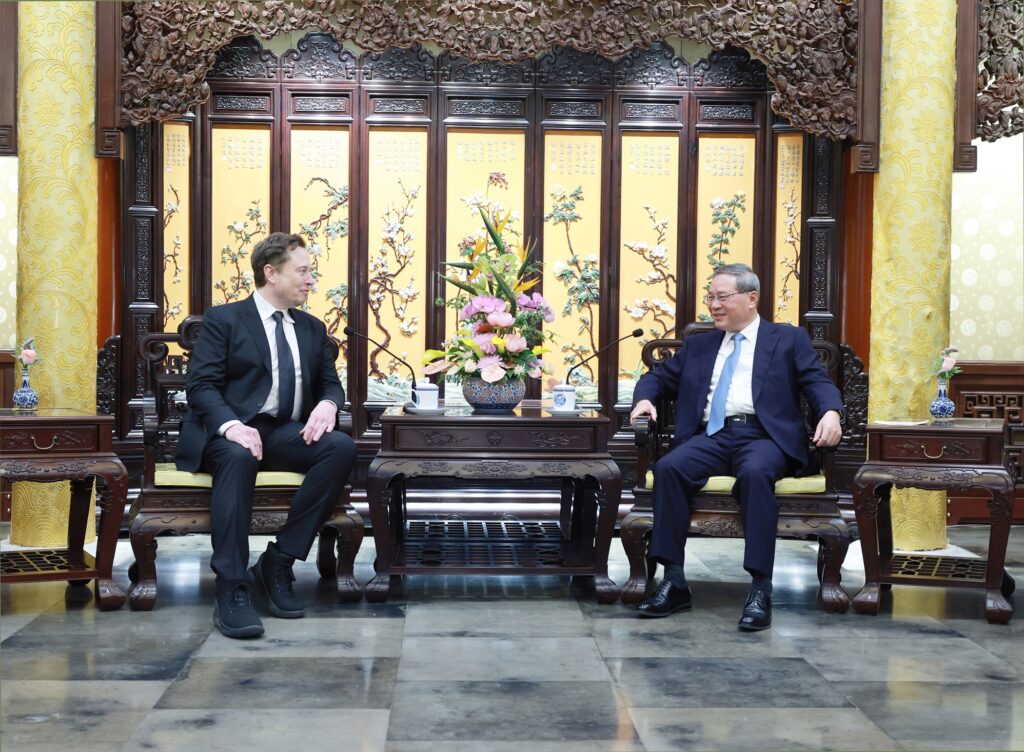
– Chinese EV makers Nio and BYD have made a deal to source batteries for a new, lower-priced EV brand, to be called “Onvo” in English and “Ledao” in Chinese, which is designed to directly compete with Tesla’s Model Y.
– Tesla CEO Elon Musk made an unannounced visit to Beijing, during which he met with Chinese Premier Li Qiang and gained approval from local authorities for Tesla cars regarding Chinese data security rules.
– During Musk’s visit Tesla’s ‘Full Self-Driving’ technology also received backing and Tesla and Chinese search engine Baidu agreed to partner on developing mapping and navigation systems for Tesla’s autonomous driving system, though other Chinese automakers are keeping competition hot.
– Leaders at U.S.-based General Motors (GM) continue to say GM is “committed to China” over the long term in spite of major shifts in consumer sentiment and local competition.
– Two Chinese automobile firms—self-driving firm Momenta and Geely-owned Zeekr—have filed to be listed on the New York Stock Exchange.
– A group of graphite miners are asking Washington to impose a 25% tariff on three China-sourced graphite products used in automobile batteries.
Associated News References:
“Exclusive: China’s Nio turns to rival BYD to power new EV brand,” Reuters, May 7
“Tesla Faces Strong Self-Driving Rivals in China,” The Wall Street Journal, May 7 [Paywall]
“U.S. automakers like GM are rapidly losing ground in China, once an engine for growth,” CNBC, May 6
“GM-Backed Self-Driving Firm Momenta Said to File for IPO in US,” Bloomberg, May 6 [Paywall]
“A Tesla rival in China is eyeing a $5 billion IPO in the U.S.,” Quartz, May 6
“Graphite miners lobby US govt to impose levy on China-sourced EV material,” Reuters, April 30
“Musk makes surprise visit to Beijing as Tesla’s China-made cars pass data security rules,” CNBC, April 29
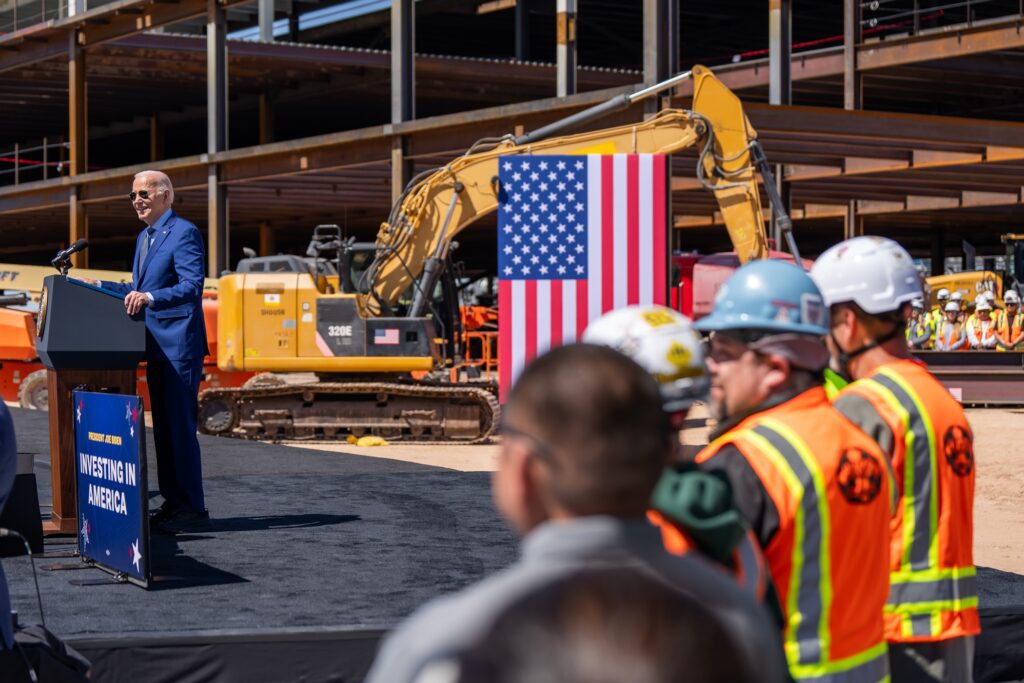
– Speaking at a campaign fundraising event in Washington, D.C., President Joe Biden called China, Japan and Russia “xenophobic” countries, reflecting similar remarks he made last month in reference to China’s unwillingness to accept immigration.
– Speaking in an exclusive interview with Fox, former president and presumptive presidential candidate Donald Trump talked several times about how “China is taking all our business” and that “it’s got to be stopped.”
– A group of seven Senate Democrats sent a letter to President Biden urging him to raise tariffs on China, arguing that “any reduction…allows China to gain a competitive advantage over hardworking Americans.”
– The newly-restructured House select committee on U.S.-China competition is closely examining China’s use of “discourse warfare,” or propaganda, especially as it relates to foreign elections.
– In an interview following his three-day trip to China, Secretary of State Antony Blinken said the U.S. has seen “evidence of attempts [by China] to influence and arguably interfere” with the U.S. election, which breaks a commitment made by Chinese President Xi Jinping.
Associated News References:
“Biden Says Japan ‘Xenophobic’ Along With China, Russia,” Bloomberg, May 3 [Paywall]
“Exclusive: Donald Trump’s claims on abortions, Biden policies, China,” Fox 2 Detroit, May 2
“Schumer, at-risk Dems ask Biden to hike tariffs on China,” Politico, May 1
“China committee eyes supply chain, biotech as Moolenaar takes helm,” Roll Call, April 30
“Blinken tells CNN the US has seen evidence of China attempting to influence upcoming US elections,” CNN, April 26

– After losing ground with its core customer base in the U.S., Starbucks sets its eyes on expanding in China, reportedly planning to open stores at an average of one every nine hours through 2025.
– Apple announces a problematic 4% drop in sales in the first quarter of 2024, with that percentage doubling in China during the same time period amidst a resurgence in popularity from its Chinese competitor Huawei.
– On May 2, U.S. law firm Mayer Brown announced plans to separate from its current Hong Kong operations and then form a new partnership “to continue its presence in Hong Kong with a practice that aligns with our strategic priorities.”
– U.S. fast food chain McDonald’s announced plans to nearly double its number of locations in China to more than 10,000 by the end of 2028 as it continues to release regional-specific menu items and create unique store features to draw Chinese customers away from its China-based competitors such as Tastien.
Associated News References:
“Starbucks Is Running Out of Americans to Drink Its Expensive Coffee,” The Wall Street Journal, May 3 [Paywall]
“Apple Reports Decline in Sales and Profit Amid iPhone Struggles in China,” The New York Times, May 2 [Paywall]
“US law firm Mayer Brown to split from Hong Kong partnership,” Reuters, May 2
“McDonald’s Supersizes China Bet as Corporate America Pulls Back,” The Wall Street Journal, April 29 [Paywall]

“China’s climate envoy to visit Washington this week, the State Department says,” Reuters, May 7
“China’s cheating threatens to wreck Paris Olympics, US anti-drugs chief says,” Politico, May 6
“New US strategy looks to blunt Russian and Chinese influence in cyberspace,” CNN, May 6
“Blinken: US delivering for Pacific islands despite China’s reach,” Voice of America, May 4
“New US-Backed Defense ‘Squad’ to Counter China in Indo-Pacific,” Bloomberg, May 3 [Paywall]
“U.S. officials wary of Chinese plans for floating nuclear plants,” The Washington Post, May 2 [Paywall]
“US, Philippines Eye Agreement to Cut China Nickel Dominance,” Bloomberg, May 1 [Paywall]
“Binance crypto boss Changpeng Zhao sentenced to 4 months in prison,” BBC, May 1
“US imposes sanctions on more than a dozen companies in China for support of Russia’s war in Ukraine,” CNN, May 1
“US labor official calls on companies to exit China’s Xinjiang,” Reuters, April 30
“San Diego Zoo will receive two new giant pandas from China after nearly all pandas in U.S. were returned,” CBS News, April 29
“Chinese professors warn of ‘culture of fear’ in Florida after DeSantis’ hiring restrictions,” Politico, April 29
“US Creates Team to Counter China’s Trade ‘Coercion’ Tactics,” Bloomberg, April 28 [Paywall]
“Key Solar Panel Ingredient Is Made in the U.S.A. Again,” The New York Times, April 25 [Paywall]
Rivalries aside, it’s vital for US and Chinese navies to keep talking
By Nong Hong
April 30, 2024
April 23 marked the 75th anniversary of the People’s Liberation Army (PLA) Navy in China, celebrated with various activities showcasing its achievements, capabilities and contributions to national defence and maritime security…
…The 19th Western Pacific Naval Symposium provided a good example of a forum for dialogue and cooperation among naval officials from diverse nations, including the US and China.

This commentary was originally released by South China Morning Post on April 30, 2024.
Rebooting China’s High-Quality Growth and Development
By Sourabh Gupta
April 30, 2024
With China’s post-COVID economy slow-to-attain takeoff velocity, Western detractors have been quick to pour scorn on China’s near and longer-term growth prospects. Much like the overstated growth prospects of 1950s Soviet Union and 1980s Japan, China’s prospects have been greatly exaggerated…
This commentary was originally released by China-US Focus on April 30, 2024.
US must Cooperate with China, Lone Ranger Mentality Outdated
By Denis Simon
April 28, 2024
Recently, several senior American officials visited China, bringing positive signals to the China-US relationship. However, at the same time, the US side is still pushing forward its strategy of containing China, with negative factors in the relationship still prominent. Denis Simon (Simon), a distinguished researcher at the Washington-based Institute for China America Studies, said in an interview with Global Times (GT) reporters Qian Jiayin and Xing Xiaojing that the US needs to realize that China and the US must become partners and deal with conflicts and changes in the international system together. In today’s world of innovation and technological development, there is no such thing as a lone ranger, and the era of going it alone is outdated…
This article was originally released by Global Times on April 28, 2024.
Biden’s New Trade Row with China is more than just Election Gimmicks
By Yilun Zhang
April 26, 2024
It sounds as if the Trump-era U.S.-China trade war—which technically has never reached an epilogue—is back again. On the same day, the Biden administration called for a tripled tariff on Chinese steel and aluminum and initiated a Section 301 investigation on Chinese maritime logistics and shipbuilding practices.
The Biden administration’s decisions did not come out of nowhere. The term “overcapacity” may be a relatively fresh soundbite that the White House recently pulled out of the dictionary to address its concerns over China’s industrial policies and growth strategy, but Washington’s grievance towards China’s industrial subsidies that fuel “excessive capacities” and its subsequent “anti-dumping” measures against Chinese products, such as solar panels, has been a long-standing theme in the bilateral trade relationship that can be traced back to the 2010s—and earlier…
Xinhua Institute Delegation Discusses U.S.-China Relations with ICAS Scholars
April 25, 2024
On Thursday, April 25, 2024, a delegation from the Xinhua Institute (XHInst) met with ICAS scholars to discuss a variety of topics related to U.S.-China relations.
The XHInst delegation was led by Mr. Cui Feng (Vice President, XHInst), accompanied by other Research Fellows.
The discussion included the exchange of perspectives and opinions on the current trend in the U.S.-China bilateral relationship, the economic and trade relations between the world’s two largest economies, the Belt and Road Initiative and U.S. responses to that initiative, U.S. legislative actions that could have a long-term impact on China, and the importance of encouraging fact-based, in-person, cultural and civilization exchanges between the two countries to promote deeper and more accurate bilateral understanding that can improve the U.S.-China bilateral relationship.
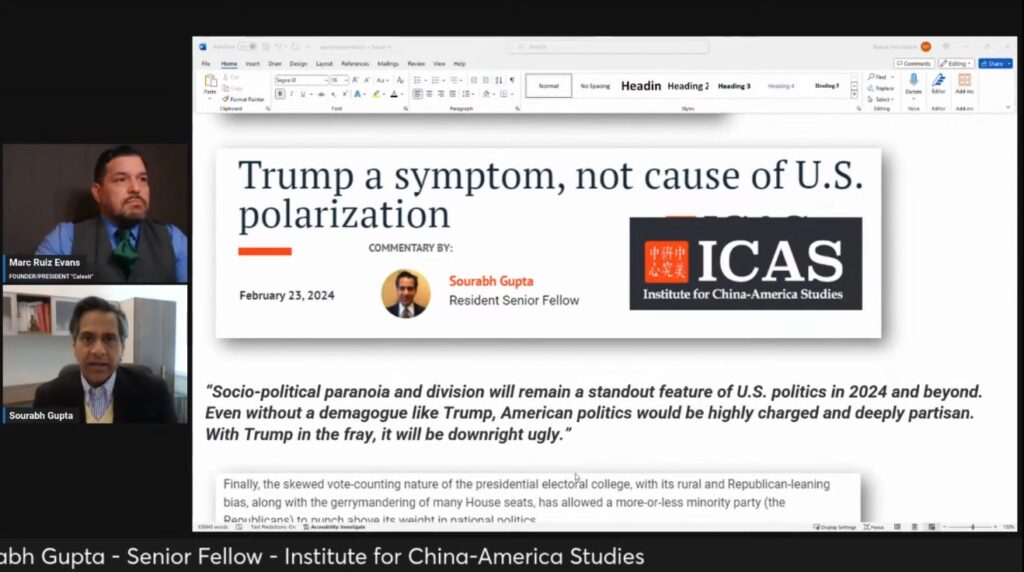
Senior Fellow Sourabh Gupta Discusses Political Polarization in America with Vlogger Marcus Ruiz Evans
April 24, 2024
On Wednesday, April 24, 2024, ICAS Senior Fellow & Head of the ICAS Trade ‘n Technology Program sat down remotely with independent vlogger Marcus Ruiz Evans to discuss Political Polarization in America.
On Tuesday, May 1, 2024, Senior Fellow Sourabh Gupta discussed the potential expansion of the BRICS grouping on CGTN America’s The Heat.
On Monday, April 29, 2024, Senior Fellow Sourabh Gupta discussed the outcomes of Secretary Antony Blinken’s visit to China on CGTN America’s The World Today
On Wednesday, April 25, 2024, Senior Fellow Sourabh Gupta was quoted by China Daily on Secretary of State Antony Blinken’s visit to China.
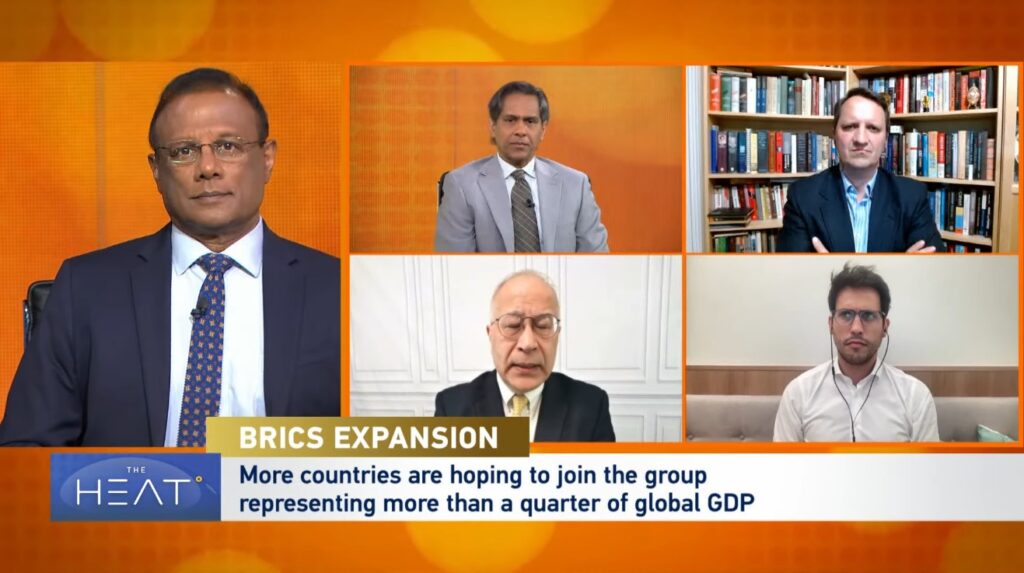
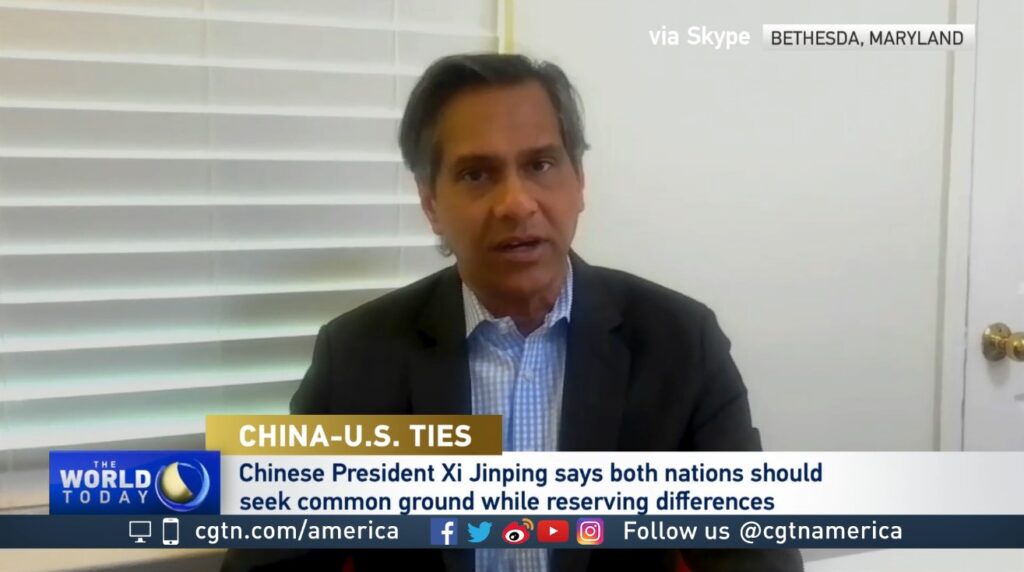

The Institute for China-America Studies is an independent nonprofit, nonpartisan research organization dedicated to strengthening the understanding of U.S.-China relations through expert analysis and practical policy solutions.
1919 M St. NW Suite 310,
Washington, DC 20036
icas@chinaus-icas.org
(202) 968-0595
© 2025 INSTITUTE FOR CHINA-AMERICA STUDIES. ALL RIGHTS RESERVED.